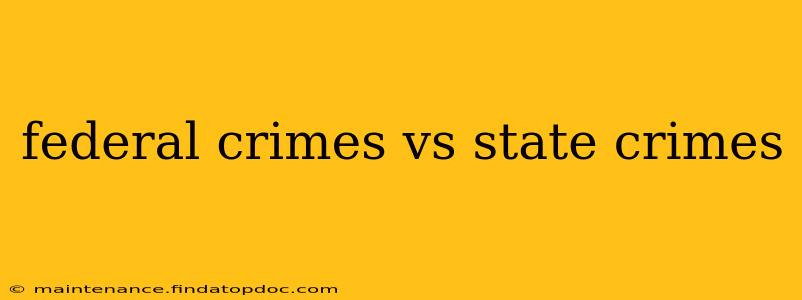The United States has a dual system of justice, meaning both the federal and state governments have their own laws and court systems. This often leads to confusion about the difference between federal crimes and state crimes. Understanding this distinction is crucial, as the penalties and legal processes involved can vary significantly. This guide will clarify the key differences and help you understand which jurisdiction handles which offenses.
What is a Federal Crime?
Federal crimes are offenses against the laws of the United States, as defined by the U.S. Congress. These crimes are investigated and prosecuted by federal law enforcement agencies like the FBI, DEA, and ATF. The jurisdiction of the federal government is limited to the areas specifically granted to it by the U.S. Constitution. This typically involves crimes that:
- Cross state lines: Crimes that involve interstate commerce, such as drug trafficking, kidnapping, or bank robbery that span multiple states fall under federal jurisdiction.
- Involve federal property or officials: Crimes committed on federal land (national parks, military bases), against federal employees, or involving federal programs (like mail fraud or tax evasion) are federal offenses.
- Are specifically defined as federal crimes: Certain crimes, such as counterfeiting, copyright infringement, and violations of federal environmental laws, are exclusively federal offenses.
What is a State Crime?
State crimes, conversely, are violations of state laws enacted by state legislatures. These crimes are investigated and prosecuted by state and local law enforcement agencies, such as state police, county sheriffs, and city police departments. State crimes encompass a broad range of offenses, including:
- Most violent crimes: Murder, assault, robbery, and rape are generally considered state crimes unless they involve a federal element (like crossing state lines).
- Property crimes: Burglary, larceny, arson, and vandalism usually fall under state law unless federal property is involved.
- Drug offenses: While some drug crimes are federal offenses (due to interstate trafficking), many drug possession or distribution cases are handled at the state level.
- Traffic violations: Almost all traffic violations are state-level offenses.
What is the Difference in Penalties?
The penalties for federal crimes are often harsher than those for similar state crimes. This is partly because federal courts have broader sentencing guidelines and access to resources like federal prisons. Factors such as the severity of the crime, the defendant's criminal history, and other mitigating or aggravating circumstances are considered when determining a sentence. Federal prisons also tend to have stricter security measures and less lenient parole conditions.
How are Federal and State Crimes sometimes related?
It's important to note that a single act can sometimes violate both federal and state laws. In such cases, the individual could face prosecution in both federal and state courts – a process known as dual sovereignty. This means they could receive separate sentences for the same underlying act.
What are some examples of Federal Crimes?
- Bank Robbery: If the bank is federally insured, the crime becomes a federal offense.
- Drug Trafficking: Transporting illegal drugs across state lines is a federal crime.
- Mail Fraud: Using the U.S. Postal Service to commit fraud is a federal offense.
- Tax Evasion: Failing to pay federal income taxes is a federal crime.
- Counterfeiting: Creating counterfeit money or other forms of currency is a federal offense.
What are some examples of State Crimes?
- Murder: Killing another person (unless it involves specific federal aspects).
- Assault and Battery: Physically harming or threatening another person.
- Robbery: Taking property from someone through force or threat.
- Burglary: Illegally entering a building to commit a crime.
- Driving Under the Influence (DUI): Driving while intoxicated.
Can a State Crime become a Federal Crime?
Yes, under certain circumstances. For example, if a state crime involves a hate crime element based on race, religion, or national origin, the federal government may also prosecute the offender under federal hate crime laws.
What happens if I'm charged with both a federal and state crime?
If charged with both, you will likely face separate trials in separate courts. This is because federal and state governments are considered separate sovereigns, each with the power to prosecute you for violations of their respective laws.
This information is for educational purposes only and should not be considered legal advice. If you have been charged with a crime, it's essential to consult with an experienced attorney.
